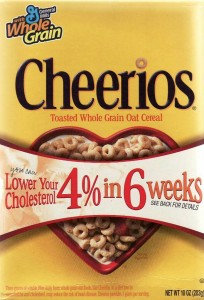 It looks like the FDA is finally getting around to looking at the absurd health claims on boxes of breakfast cereals. And about time too, I’d say. For starters, the FDA picked on General Mills’ Cheerios. Cheerios boxes display banners claiming that if you eat this cereal, you will reduce your cholesterol by 4% is 6 weeks (see previous post on this). This, General Mills says, is “clinically proven.” Yes, but the trial on which General Mills bases this claim substitutes one serving of Cheerios for each of two meals a day. Hey – that ought to work!
It looks like the FDA is finally getting around to looking at the absurd health claims on boxes of breakfast cereals. And about time too, I’d say. For starters, the FDA picked on General Mills’ Cheerios. Cheerios boxes display banners claiming that if you eat this cereal, you will reduce your cholesterol by 4% is 6 weeks (see previous post on this). This, General Mills says, is “clinically proven.” Yes, but the trial on which General Mills bases this claim substitutes one serving of Cheerios for each of two meals a day. Hey – that ought to work!
In its warning letter, the FDA says that if Cheerios lowers cholesterol, it is claiming to work like a statin drug. If Cheerios acts like a drug, it has to be treated like a drug. Cheerios, says the FDA, “is not generally recognized as safe and effective for use in preventing or treating hypercholesterolemia or coronary heart disease. Therefore…it may not be legally marketed with the above claims in the United States without an approved new drug application.”
So what’s going on here? I collect cereal boxes and I’m guessing that I bought the one shown here at least two years ago. The boxes have changed since then but similar claims appear on the Cheerios website. Maybe in this new administration the FDA can get a grip on silly and misleading health claims. Let’s hope.
Update May 18: Advertising Age advises marketers about how to avoid FDA interference: know the rules, don’t assume that breaking them is OK even if you have done so for a long time, follow the rules. Seems like good advice.
Update May 25: Europeans applaud this FDA action. They think we have gone much too far with health claims.
Update January 18, 2010: At a visit to the FDA last week, I saw a more recent Cheerios box that I somehow missed – lower your cholesterol by 10% in one month. This one disappeared quickly, but I found a good description of what happened on the Consumer World Mouse Print site. General Mills sponsored a study and rushed the box into print.


